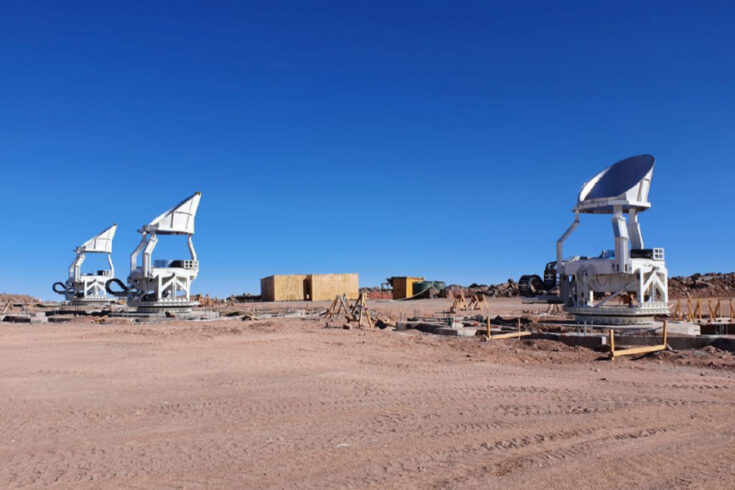UK joins search for origins of the Universe

Above: The three small aperture telescope platforms following their recent installation (May 2022) at the site in Chile. Courtesy SO project
With new investment, six UK universities will deliver a major upgrade to the cosmic microwave background (CMB) experiment known as Simons Observatory (SO).
The CMB is the trail of heat left by the Big Bang, and studying its tiny fluctuations help scientists to understand how the Universe was formed.
What is Simons Observatory (SO)?
SO is a ground-based telescope on a mountain 5,200 metres (17,000 feet) above the Atacama Desert in Chile.
Prior to the new UK contribution, SO was comprised of a single large aperture telescope and 3 small aperture telescopes.
Together, they will make precise and detailed observations of the CMB, the heat left over from the hot, early days of the history of the Universe.
Tiny fluctuations in the CMB radiation tell us about fluctuations in how matter was distributed shortly after the Big Bang, which are the initial seeds of all structure in the Universe.
Studying the CMB gives clues about both the origin of structure, and how the initial matter fluctuations have grown over time to form the structure of the Universe we know now.
Observations with SO promise to provide these breakthrough discoveries that will help us understand how the Big Bang led to the formation of stars and galaxies.
The two types of telescope on SO will do two different jobs. The small aperture telescopes are focused on searching for signatures of primordial gravitational waves.
If detected, this signal would open a unique observational window on physics at very early times and at ultra-high energies.
The large aperture telescope will address a range of unsolved questions including:
- the nature of neutrinos and other relativistic species
- the nature of dark matter
- the physics giving rise to the observed accelerated expansion of the Universe
An international effort
The international project is led by the US, supported by the Simons Foundation and the Heising-Simons Foundation, and includes 85 institutes from 13 countries.
Starting this month, the six universities delivering the major new UK contribution are:
- Cambridge
- Cardiff
- Imperial College London
- Manchester
- Oxford
- Sussex
With £18 million funding from UK Research and Innovation (UKRI), through the UKRI Infrastructure Fund, the UK will be leading on two additional telescopes, providing a major increase in the sensitivity of the facility. Under the funding, the UK will also be providing expertise in data processing and analysis.
Addressing profound questions in science
The UK lead, Professor Michael Brown, of The University of Manchester, said: "SO is poised to become the leading CMB project of the 2020s.
"It will address some of the most profound questions in all of science.
"With this major new funding, UK scientists will continue to play a world-leading role at the forefront of this high-profile science area."
Dr Colin Vincent, Associate Director for Astronomy at the Science and Technology Facilities Council, said: "This major investment by UKRI will allow UK researchers to spearhead discoveries alongside partners in this international facility, uncovering the secrets from the very dawn of time.
SO spokesperson Professor Mark Devlin, from the University of Pennsylvania, said: "SO is very excited by the addition of the UK contribution to the programme.
"The addition of the new telescopes and researchers will be a significant addition to our programme and will help to ensure SO returns amazing science for years to come."












